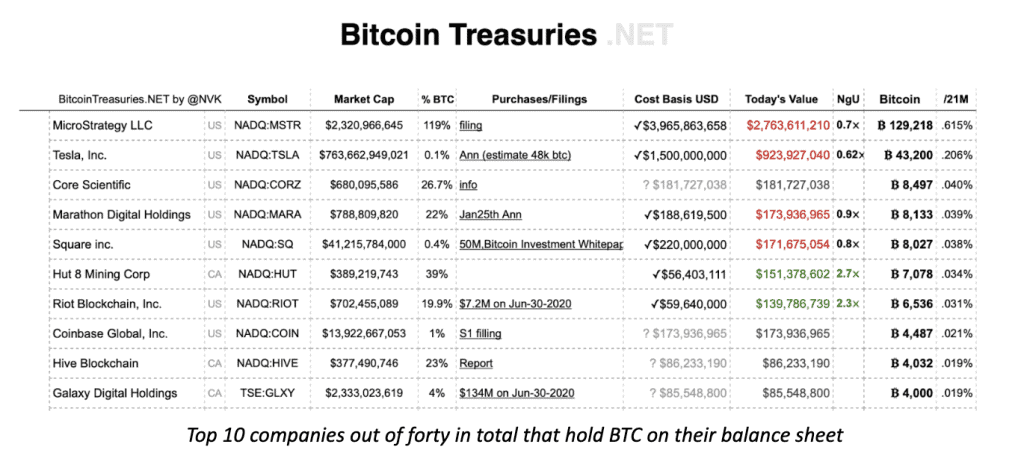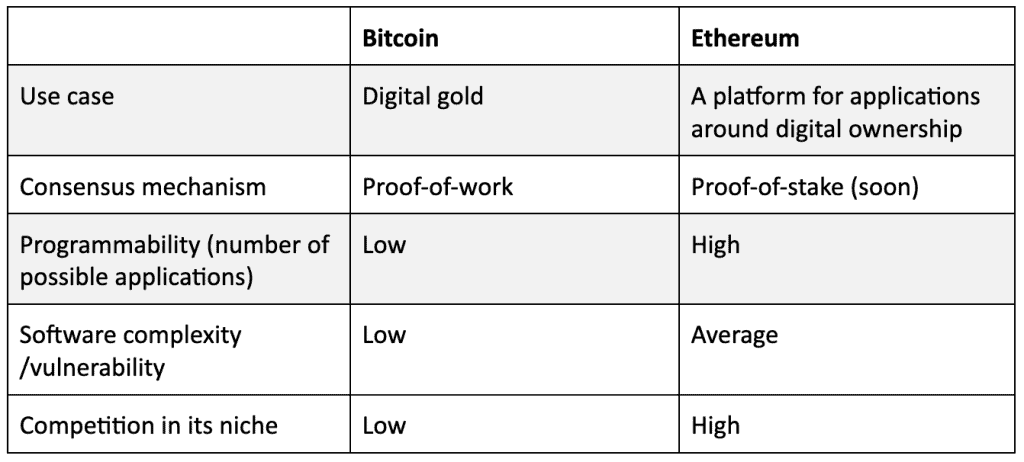The Difference Between Bitcoin and Ethereum

In the media, the terms Bitcoin and Ethereum are as tightly associated as chair and table. Also, there is consensus among investors that these ‘crypto blue chips’ are the most investable coins. But that obscures the fact that Bitcoin and Ethereum are very different. In what sense?
Did I just say consensus? That’s a utopian notion in a world as tribal as crypto. Hardcore Bitcoiners wouldn’t even utter the word Ethereum in the same sentence as their favorite project. And they wouldn’t call Bitcoin ‘crypto’, for fear of being associated with the slew of projects that use comparable technology but are fundamentally different.
Might there be a kernel of truth to this distinction? Might Bitcoin be in some sense different from all the other projects, including Ethereum? Yes. And does this mean that Ethereum is just a copycat of Bitcoin? Not at all.
The Key Difference Between Bitcoin and Ethereum
Let’s have a look at the first sentence of Satoshi’s whitepaper:
“A purely peer-to-peer version of electronic cash would allow online payments to be sent directly from one party to another without going through a financial institution.”
This sums up quite a bit of what we need to know.
Now let’s have a look at what it says in Ethereum’s whitepaper, in the first paragraph:
“What Ethereum intends to provide is a blockchain with a built-in fully fledged Turing-complete programming language that can be used to create “contracts” […]”
Whoa. That’s a different ballpark. Let’s compress it even further, to get a broad-stroke approximation of the difference:
- Bitcoin is digital hard money that you can own and transact without permission.
- Ethereum is a software development platform for financial applications.
The Key Similarities Between Bitcoin and Ethereum
Now, let’s look at some broad similarities:
- Both Bitcoin and Ethereum are currencies that can be used withou needing anyone’s permission.
- They both use blockchain technology.
- They are both founded on the principle of mining to protect the network.
Different Use Cases of Bitcoin and Ethereum
Now let’s descend from the realm of abstract definitions. What are the use cases of both projects?
Bitcoin’s Use Cases
Bitcoin is used as a ‘savings account in cyberspace’. It makes ownership possible of money that can’t be confiscated by a government. This protects people’s money under oppressive regimes or countries with high inflation. Like with physical gold in your own vault, owning it comes without counterparty risk. Also, through Bitcoin’s Lightning network, people can do fast (within seconds) transactions that can’t be reversed (final settlement).
Ethereum’s Use Cases
Ethereum is the ‘digital commodity’ that powers different financial apps and online economies. Currently, the most prominent use cases are:
- Stablecoins: the majority of stablecoins are issued on Ethereum. People use stablecoins to protect their crypto gains. And for people without access to the dollar, dollar stablecoins are a great way to get dollar exposure.
- Decentralized Finance: decentralized exchanges (dexes) like Uniswap mediate lending, borrowing and trading directly between wallets, without an intermediary. These financial services are fast and permissionless. Many dexes run on Ethereum.
- NFTs: certificates of ownership of anything, but predominantly online art.
How Immutable are Bitcoin and Ethereum?
Now that we’ve looked at some core properties and use cases, let’s look at an important property of blockchain tech: its immutability. In other words: transactions in principle are not reversible. How do Bitcoin and Ethereum hold up in this regard?
The most important properties of Bitcoin are set in stone. Old software to run a node is still compatible with the current software. There will never be more than 21 million Bitcoins in circulation. The odds of that changing are about as high as Genesis becoming the final book of the Bible.
Contrast this to Ethereum. Here, both the consensus mechanism and the monetary policy are open to experimentation. No one knows if the issuance of Ether will be inflationary or deflationary in the long term: it depends on an interplay of parameters that are still being tinkered with. The consensus mechanism is being changed from proof-of-work to proof-of-stake, which is a hugely complex operation (see: the Ethereum Merge). All this experimentation gives flexibility. But the flipside is complexity and risk.
Differences in Decentralization: In what sense can you truly own Bitcoin vs. your Ether?
Bitcoin is money that you can own. Don’t you own our ‘normal’ money in the bank? Not really. If the bank goes belly up, you’re last in line as a depositor. Sure, the government will step in to cover your losses but that’s only after you lost your money in the first place. The keys to your fiat money are controlled by the government!
This goes to show that in traditional finance, there’s always counterparty risk: an institution or country you are forced to rely on. With Bitcoin, this isn’t the case. There is no ‘CEO’, no management team that can fail you or be pressured to hand over your coins to the government or other actors. The influence over the network is decentralized: it is distributed among miners, node runners, and developers. It is a protocol, similar to how TCP/IP (data transmission on the Internet) is a protocol. Updates to a protocol are made only when an agreement is reached between many parties.
This situation is similarly decentralized in Ethereum but slightly less so. This is partly an ‘image problem’, founder Vitalik Buterin is still an influential figure with a seat on the Ethereum foundation, whereas Bitcoin founder Satoshi has long left the scene. Like in the Bitcoin community, everyone can make an EIP, an Ethereum Improvement Proposal, which may or may not be accepted by developers and miners. It’s just that Ethereum has had this major incident of the DAO hack in 2016. What followed was the infamous decision to roll back the chain and fork it. In the process, the hacked version of the blockchain was invalidated by decree, and transactions were reversed. This is something that should not happen again if Ethereum wants to claim that code is law and no human actor controls your Ether.
Bitcoin and Ethereum as Financial Assets
Bitcoin was the first cryptocurrency. You might have heard about Bitcoin’s ‘immaculate conception’. That’s a cute way to convey that the circumstances under which Bitcoin saw the light are without ‘original sin’. Meaning, in its infancy, Bitcoin was a hobby project for cryptographers and computer scientists. Bitcoin didn’t even have a price for the first 1.5 years after its existence!
This origin story is more than just a story: it matters in a few ways. Bitcoin was obviously created to be money but it wasn’t created to make money for creators or early investors. That can’t be said from any crypto project that came after, including Ethereum. This matters in the legal sense: financial watchdogs like the American SEC take notice. Most crypto projects after Bitcoin, including Ethereum, have a so-called pre-mine of coins that is distributed among founders and sold to early investors. These projects stand the risk of being labeled a security by financial regulators. Ethereum has dodged this fate but there still lingers some doubt as to what category it falls into: a security or a commodity. Bitcoin is firmly the latter and this makes it much less risky to institutional investors. It’s one of the reasons that dozens of companies have Bitcoin on their balance sheet (see top 10 in the table below), while this is still less common for Ethereum.

Differences in Competition
Ethereum has never been a direct competitor to Bitcoin, as it tries to achieve something different: it implies a huge range of possible applications. If Bitcoin is immutable like stone, then Ethereum is fluid like water. They are different elements.
Bitcoin is the Godfather, the King. As such, Bitcoin has had many pretenders to the throne. Litecoin was the prince, Doge was the jester. Bitcoin cash and the likes were clones (forks) with some parameters tweaked. But after the dust of these ‘fork wars’ settled down, it became clear that Bitcoin is the only proof-of-work blockchain that is left competing in the niche of hard money.
So there are no real ‘Bitcoin killers’ left. How about the so-called Ethereum killers or ‘alt layer 1’s?’ Ethereum has indeed lost market share in DeFi and NFT land to chains like Solana and Avalanche. It remains to be seen if the dominance of Ethereum will further decline. Possibly, but this could still mean that the market cap of Ethereum would rise. The potential upside in niches of decentralized finance and NFTs are so huge that many Layer 1’s could coexist and become huge. It could even mean that Ethereum would lose ground to the competition while still ‘flipping’ Bitcoin in market cap.
Differences in Price Expectation
Bitcoin is called digital gold with a reason: it shares characteristics of gold (scarcity, immutability, no counterparty risk). But unlike gold, it is tailored for the online world we inhabit. If Bitcoin were to reach a similar total market value as gold, this would mean a price of about $500,000 per Bitcoin.
For Ethereum, it is harder to point to a similar benchmark. Precisely because it is a platform on which anything is possible, the total addressable market is enormous. Will Ethereum deliver on its potential of being the number one platform on which many financial transactions and applications (from stock trading to insurance) will take place? If so, its current market cap is only a fraction of what it could become.
Conclusion
Bitcoin and Ethereum are fundamentally different beasts. Let’s summarize the differences.

















Responses